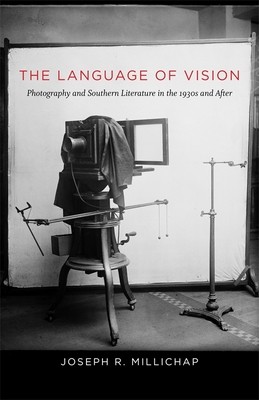
- We will send in 10–14 business days.
- Author: Joseph R Millichap
- Publisher: LSU Press
- ISBN-10: 0807162779
- ISBN-13: 9780807162774
- Format: 14.8 x 22.4 x 1.9 cm, kieti viršeliai
- Language: English
- SAVE -10% with code: EXTRA
Reviews
Description
The Language of Vision celebrates and interprets the complementary expressions of photography and literature in the South. Southern imagery and text affect one another, explains Joseph R. Millichap, as intertextual languages and influential visions. Focusing on the 1930s, and including significant works both before and after this preeminent decade, Millichap uncovers fascinating convergences between mediums, particularly in the interplay of documentary realism and subjective modernism.
Millichap's subjects range from William Faulkner's fiction, perhaps the best representation of literary and graphic tensions of the period, and the work of other major figures like Robert Penn Warren and Eudora Welty to specific novels, including Ralph Ellison's Invisible Man and James Agee's Let Us Now Praise Famous Men. Fleshing out historical and cultural background as well as critical and theoretical context, Millichap shows how these texts echo and inform the visual medium to reveal personal insights and cultural meanings. Warren's fictions and poems, Millichap argues, redefine literary and graphic tensions throughout the late twentieth century; Welty's narratives and photographs reinterpret gender, race, and class; and Ellison's analysis of race in segregated America draws from contemporary photography. Millichap also traces these themes and visions in Natasha Trethewey's contemporary poetry and prose, revealing how the resonances of these artistic and historical developments extend into the new century. This groundbreaking study reads southern literature across time through the prism of photography, offering a brilliant formulation of the dialectic art forms.
EXTRA 10 % discount with code: EXTRA
The promotion ends in 23d.06:58:06
The discount code is valid when purchasing from 10 €. Discounts do not stack.
- Author: Joseph R Millichap
- Publisher: LSU Press
- ISBN-10: 0807162779
- ISBN-13: 9780807162774
- Format: 14.8 x 22.4 x 1.9 cm, kieti viršeliai
- Language: English English
The Language of Vision celebrates and interprets the complementary expressions of photography and literature in the South. Southern imagery and text affect one another, explains Joseph R. Millichap, as intertextual languages and influential visions. Focusing on the 1930s, and including significant works both before and after this preeminent decade, Millichap uncovers fascinating convergences between mediums, particularly in the interplay of documentary realism and subjective modernism.
Millichap's subjects range from William Faulkner's fiction, perhaps the best representation of literary and graphic tensions of the period, and the work of other major figures like Robert Penn Warren and Eudora Welty to specific novels, including Ralph Ellison's Invisible Man and James Agee's Let Us Now Praise Famous Men. Fleshing out historical and cultural background as well as critical and theoretical context, Millichap shows how these texts echo and inform the visual medium to reveal personal insights and cultural meanings. Warren's fictions and poems, Millichap argues, redefine literary and graphic tensions throughout the late twentieth century; Welty's narratives and photographs reinterpret gender, race, and class; and Ellison's analysis of race in segregated America draws from contemporary photography. Millichap also traces these themes and visions in Natasha Trethewey's contemporary poetry and prose, revealing how the resonances of these artistic and historical developments extend into the new century. This groundbreaking study reads southern literature across time through the prism of photography, offering a brilliant formulation of the dialectic art forms.


Reviews